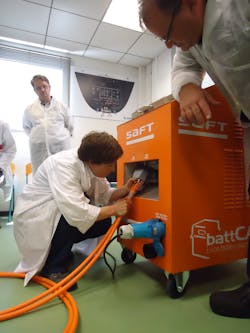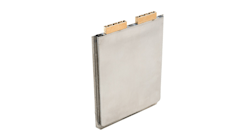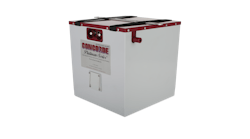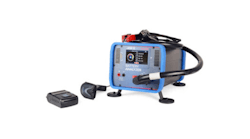Saft Offers Li-ion Training for the Battery System and its GSE
Saft is offering the first Li-ion aircraft battery training that includes the battery system and its ground support equipment named battCARE. The company designs and manufactures batteries in more than 14 production sites distributed worldwide and also offers training for airliners, MRO operators as well as technicians and engineers working in battery shops.
All aircraft batteries, whatever the technology, require checking and maintenance in order to make sure they are safe when installed and they perform their required functions especially in emergency conditions on board the aircraft. Maintenance checks also permit any problems to be identified and corrected. Apart from the question of safety, the avoidance of failure on board the aircraft, with consequent costly impact on delays, reduces operational costs.
The Batteries
Li-ion batteries have been used for large industrial applications in railways, telecommunication, electric vehicles, military aircraft, and satellites for many years. For example, more than 1.6MWh of Saft Li-ion batteries are currently in orbit, delivering reliable on-board power for more than 125 different GEO satellites. However, the use of Li-ion battery systems for commercial aircraft is quite new and requires modifying the way maintenance is performed compared to Ni-Cd batteries.
The Airbus A350 XWB is the first commercial aircraft to be equipped with Saft Li-ion batteries. The Li-ion batteries have the same functionalities as the Ni-Cd batteries: starting the APU, regulating the DC network, and providing backup power for vital on-board electrical systems in case of emergency. In addition, they also bring numerous advantages in comparison to other battery technologies. For example, on the A350, the installation of four Li-ion batteries has reduced the aircraft weight by more than 80 kg, and has allowed access to direct on-board controls from the cockpit panel with simplified maintenance procedures compared to Ni-Cd.
Indeed, Ni-Cd battery maintenance procedures and functional tests are based on different steps from periodic checks, regular checks, and general overhauls performed in battery shops. Saft has been offering training courses for more than 20 years with the content evolving with new product introduction and more modern training support material.
For Li-ion batteries, the maintenance procedures are totally different: the regular checks, periodical checks, and general overhaul are replaced with a single check every two years. Furthermore, the battCARE® has been developed allowing on wing or off wing maintenance capabilities. The on wing maintenance has the advantage of allowing the checks of the batteries directly on the aircraft reducing the maintenance duration as there is no need to remove the battery from the aircraft to bring it to a battery shop, saving about two hours per aircraft.
Also, contrary to Ni-Cd batteries, the Li-ion batteries are sealed and contain cells and electronics. All of that leads to dedicated Li-ion battery training (LBT) to ensure proper and safe maintenance programs.
“Our aim is to help operators of the Airbus A350 XWB and other future aircraft equipped with Saft Li-ion battery systems to enjoy a lifetime of safer, reliable, and trouble-free operations,” says Laurent Bressoud, product and support manager for Saft’s aviation batteries and developer of the LBT content.
The Training
The LBT is categorized as specialized training and satisfies ATA 104 level 4 objectives. It is performed by highly skilled technical trainers and aims for the trainees to become autonomous to safely maintain and operate Li-ion batteries during their life-cycle and learn the necessary theoretical and practical knowledge to optimize the battery’s life (performance, safety, and operating costs). All the trainers have a technical background with operational skills which allow them to answer theoretical as well as very practical concerns. They also have been involved in the Li-ion battery development since the beginning.
A room with hands-on capability has been dedicated to the LBT at Aerocampus, the center of aviation operations and maintenance training on the outskirts of Bordeaux, France. Surrounded by vineyards, the site covers 64 acres with 20,000 m2 of training facilities. It brings together major players in the aeronautical sector, from training agencies, industrial partners to schools and universities. In addition to initial training in aeronautics, it is also the location of short-term technical training courses performed by companies such as Airbus Defence & Space, Sabena technics, and Saft.
The two-day training program covers the battery integration in the aircraft, principal components of the battery and the battCARE, the electrochemical basis, the explanation of the storage conditions and procedures including the concept of balancing the cells, the alarm management, the principle of the dedicated Helpdesk as well as the basics on shipping instructions and transport.
A full section is dedicated to the battCARE, as it is a new equipment with specific functionalities. A step-by-step approach allows mastering the equipment from the connections to the battery to a review of its software. The battCARE has been designed to perform periodic battery checks, capacity and impedance measurements, commissioning charges, and storage charges. The training reviews when and how to perform safely in confidence for each operation.
Special care has also been taken into consideration regarding safety, as this is a main concern from the airlines due to the innovative nature of using Li-ion batteries for commercial aircraft. Safety has been the focal point of the battery development program and the Saft Li-ion battery for the A350 is the first Li-ion battery that is compliant to DAL A, the highest achievable Design Assurance Level. Furthermore, extensive tests have been realized in laboratory, on ground and during test flights by Saft and Airbus.
To optimize the interactions between trainees and trainers, no more than eight persons can be trained per session and time is dedicated to answer questions or to go into specific subjects in greater depth. Five sessions have already been organized with success and more are planned.
“The Saft trainer had a high level of product knowledge and the presentation and support material were very clear and helpful,” said David, a distributor’s product manager, whereas an airline battery shop engineer highlighted the fact that he has been reassured about the Saft Li-ion battery safety thanks to Saft's years of expertise and the well-documented training.
Upon completion of the LBT, after a final assessment, the trainees receive a ‘Certificate of Completion’. A visit of the Saft factory in Bordeaux concludes the training, allowing for a full understanding of the aircraft battery production.
This training, today dedicated to the Airbus A350, will be extended to other aircraft and helicopters as the Li-ion batteries are getting more popular within the aeronautic commercial market.
Saft manufactures industrial batteries including aircraft batteries, with more than 300,000 Ni-Cd aircraft batteries produced. It designs and manufactures batteries in more than 14 production sites distributed worldwide and also offers training for airliners, MRO operators as well as technicians and engineers working in battery shops. For more information visit www.saftbatteries.com.




